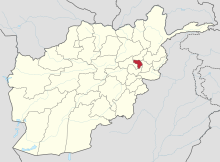Kuhistan rebellion (July 1930)
Purdil Khan | |
|---|---|
| Minister of Defence | |
| In office March 1929 – October 1929 | |
| Monarch | Habibullāh Kalakāni |
| Preceded by | Sayyid Husayn |
| Succeeded by | Shah Mahmud Khan |
| Personal details | |
| Died | July 1930 modern-day Kapisa Province, Kingdom of Afghanistan |
| Political affiliation | Saqqawists |
Purdil Khan (died 1930) was an Afghan Saqqawist politician who served as minister of defence under Habibullāh Kalakāni during the Afghan Civil War of 1928–29, and briefly became the leader of the movement during a rebellion in July 1930.
Personal life
Purdil was the uncle of Habibullāh Kalakāni.[1]
Role in the 1928–29 civil war
Purdil was appointed field marshal of the Saqqawist Afghan army in January 1929, following the capture of Kabul.[2] By 24 March, Purdil had become minister of defense.[3]
After the Saqqawist capture of Kandahar, Purdil pleaded to Kalakani that Ali Ahmad Khan be spared, but this was refused.[4]
Purdil took command in the following battles:[3]
- Battle of Maydan, 24 March 1929. Saqqawist victory.[3]
- Battle of Shaykhabad, 9 April 1929. anti-Saqqawist victory.[5]
- Battle of Ghazni, 28 April 1929. Saqqawist victory.[6]
- Siege of Kalat, 19–23 May 1929. Saqqawist victory.[7]
- Capture of Kandahar, 31 May 1929. Saqqawist victory.[8]
- Fall of Kabul, 9–13 October 1929. anti-Saqqawist victory, end of the civil war.[9]
In October 1929, Mohammad Nadir Khan captured Kabul, deposed Kalakani and became the new king of Afghanistan. In this process, Purdil was ousted as minister of defence. Later in 1929, Nadir appointed Shah Mahmud Khan as Purdil's successor.[10]
Kuhistan rebellion and death
| Kuhistan rebellion (July 1930) | |||||||
|---|---|---|---|---|---|---|---|
 A map of modern-day Kapisa Province, where the fighting took place. | |||||||
| |||||||
| Belligerents | |||||||
| Kingdom of Afghanistan | Saqqawist rebels | ||||||
| Commanders and leaders | |||||||
| Mohammed Nadir Shah | Purdil Khan † | ||||||
| Casualties and losses | |||||||
| Unknown | 3,000 captured | ||||||
After the end of the civil war, Purdil organized a new revolt.[11] In July 1930,[1] Saqqawists fought against state forces in modern-day Kohistan District, Kapisa Province.[12][1] The rebellion was crushed within a week.[12] After the rebellion was suppressed, 3000 of the rebels were captured and 11 of the ringleaders were executed,[1] while the rest were allowed to go home and "follow some honest pursuit".[12] Purdil was killed during the fighting.[13]
References
- ^ a b c d Gladstone, Soloman W. E. (2018-03-02). A History of Afghanistan Vol II. Creative Media Partners, LLC. p. 322. ISBN 9781378970881.
- ^ Muḥammad, Fayz̤; McChesney, R. D. (1999). Kabul under siege: Fayz Muhammad's account of the 1929 Uprising. Markus Wiener Publishers. p. 57. ISBN 9781558761544.
- ^ a b c Muḥammad, Fayz̤; McChesney, R. D. (1999). Kabul under siege: Fayz Muhammad's account of the 1929 Uprising. Markus Wiener Publishers. p. 68. ISBN 9781558761544.
- ^ Muḥammad, Fayz̤; McChesney, R. D. (1999). Kabul under siege: Fayz Muhammad's account of the 1929 Uprising. Markus Wiener Publishers. p. 84. ISBN 9781558761544.
- ^ Muḥammad, Fayz̤; McChesney, R. D. (1999). Kabul under siege: Fayz Muhammad's account of the 1929 Uprising. Markus Wiener Publishers. p. 71. ISBN 9781558761544.
- ^ Muḥammad, Fayz̤; McChesney, R. D. (1999). Kabul under siege: Fayz Muhammad's account of the 1929 Uprising. Markus Wiener Publishers. p. 75. ISBN 9781558761544.
- ^ Muḥammad, Fayz̤; McChesney, R. D. (1999). Kabul under siege: Fayz Muhammad's account of the 1929 Uprising. Markus Wiener Publishers. p. 82. ISBN 9781558761544.
- ^ Muḥammad, Fayz̤; McChesney, R. D. (1999). Kabul under siege: Fayz Muhammad's account of the 1929 Uprising. Markus Wiener Publishers. p. 219. ISBN 9781558761544.
- ^ Muḥammad, Fayz̤; McChesney, R. D. (1999). Kabul under siege: Fayz Muhammad's account of the 1929 Uprising. Markus Wiener Publishers. p. 274. ISBN 9781558761544.
- ^ Adamec, Ludwig (1975). Historical and Political Who's Who of Afghanistan by Ludwig W. Adamec. ISBN 3201009210.
- ^ Emadi, Hafizullah (2005). Culture and Customs of Afghanistan. Greenwood Publishing Group. p. 35. ISBN 9780313330896.
- ^ a b c Ali, Mohammed (1933). Progressive Afghanistan. Punjab Educational Electric Press. pp. 179, 180.
- ^ Yunas, S. Fida (2002). Afghanistan: The Peshawar Sardars' branch of Barakzais. p. 78.